Best Ecommerce CRM, or Customer Relationship Management, is a powerful tool that helps e-commerce businesses manage customer relationships, track customer data, and improve the overall customer lifecycle.
Choosing the right CRM software for your business is crucial to achieving successful ecommerce operations.
With the right CRM by your side, you can gain valuable insights into customer history, preferences, and behavior, allowing you to deliver personalized experiences and improve customer satisfaction.
- Zoho CRM offers built-in inventory management capabilities.
- Agile CRM provides lead scoring and customizable workflows.
- Capsule CRM excels in contact management and workflow capability.
- Freshworks CRM features AI-powered lead scoring and email marketing.
- Pipedrive offers advanced contact management and customizable automation.
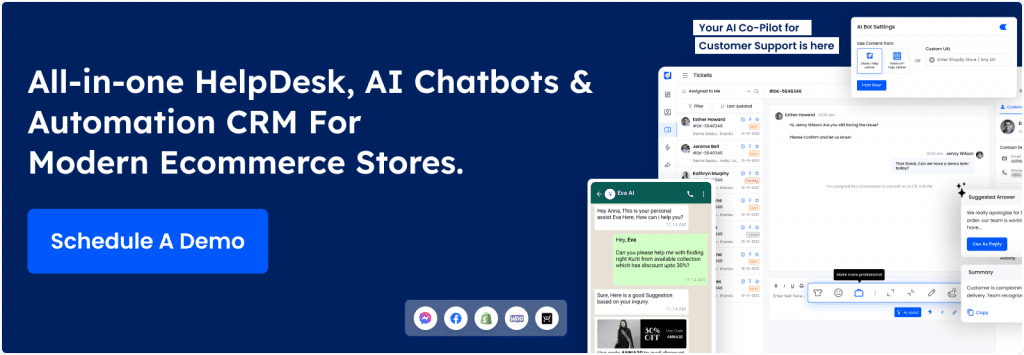
What is CRM For Ecommerce?
Ecommerce CRM tools streamline online businesses’ customer relationships, sales, and marketing efforts.
These tools cater specifically to small businesses in the ecommerce sector by offering features like customer data management, order processing, and personalized marketing campaigns.
7 Top Ecommerce CRM Software
When considering the top Ecommerce CRM software in 2024, popular options include Zoho CRM, Agile CRM, Capsule CRM, Freshworks CRM, and Pipedrive.
These platforms offer a range of features tailored to small businesses, such as customer data management, sales analytics, and marketing automation.
Zoho CRM
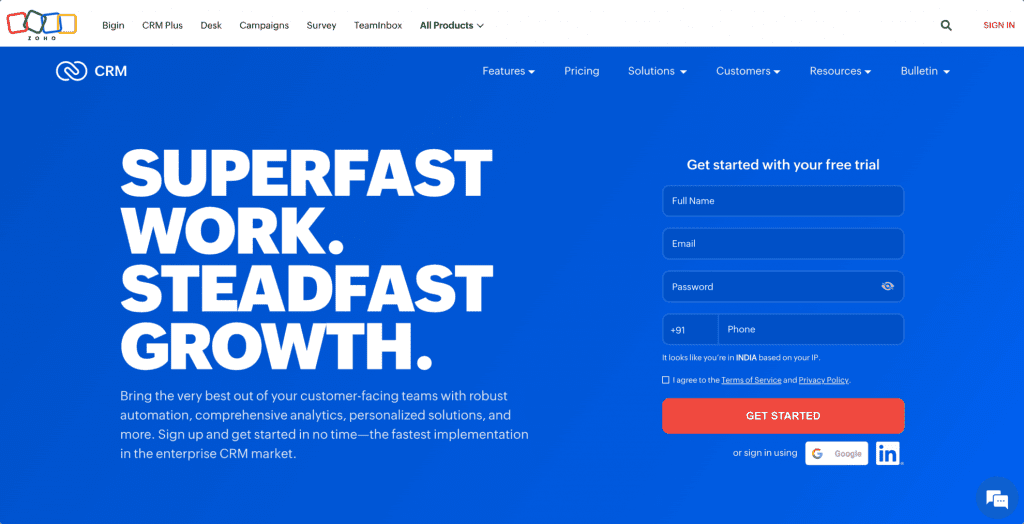
Zoho CRM offers small businesses a versatile solution for managing customer relationships, boosting sales, and streamlining operations in the online retail sector.
- Built-in inventory management capabilities
- All-encompassing solution for sales, service, and marketing
- Pricing starting at $57 per user per month
Agile CRM
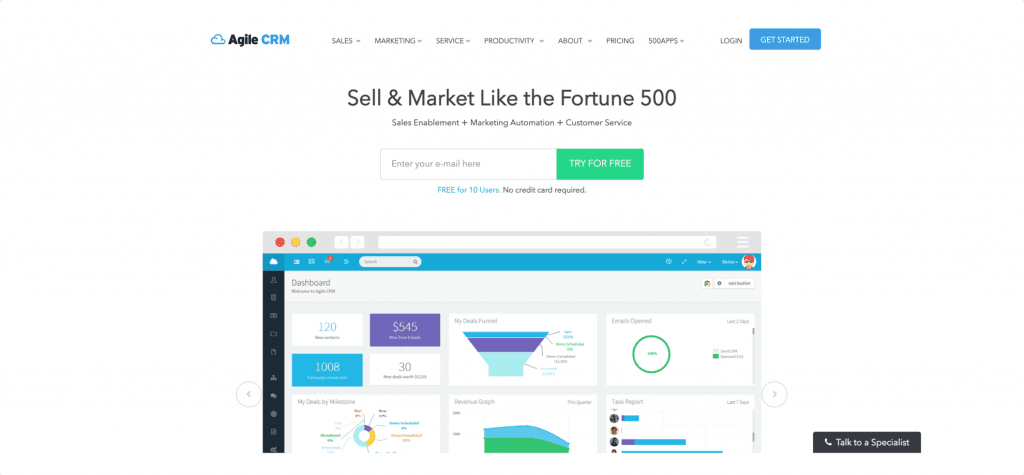
Agile CRM is a top choice for small businesses in 2024. It offers robust marketing automation tools and a user-friendly interface at a starting price of $8.99 per user per month.
Features like lead scoring and customizable workflows cater to businesses seeking automation.
With its agility and 14-day free trial, Agile CRM is ideal for those looking for flexibility and efficiency in managing customer relationships.
Capsule CRM
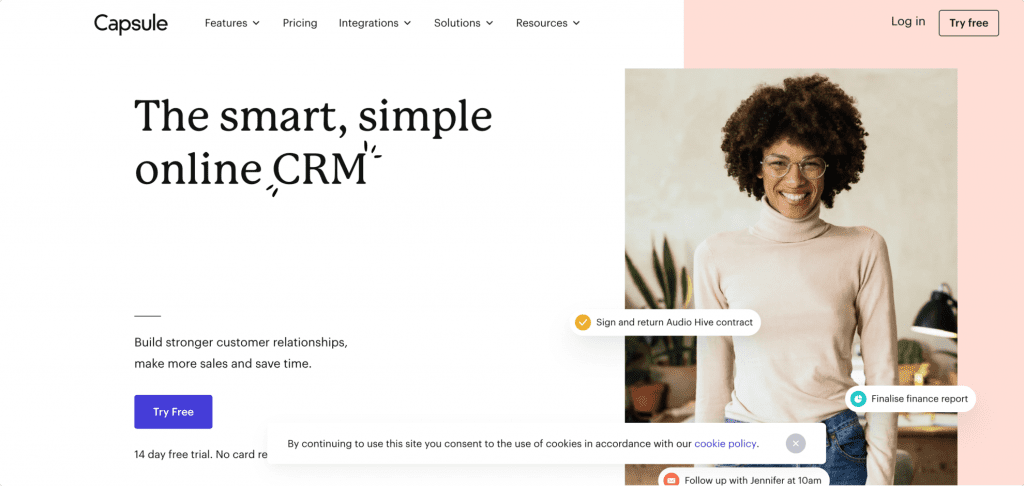
Consider Capsule CRM as your top choice for enhancing customer relationships and streamlining operations in your small ecommerce business.
- Highly rated at 8.6, ideal for small businesses
- Appreciated for ease of use and customer support
- Specializes in contact management and workflow capability

Freshworks CRM
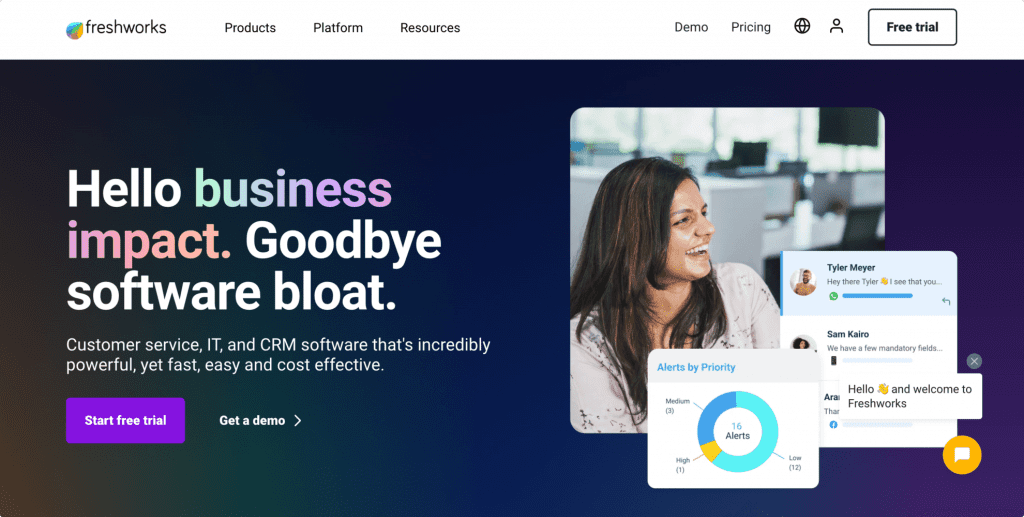
Freshworks CRM stands out as a leading choice for small ecommerce businesses seeking advanced customer relationship management tools.
It offers AI-powered lead scoring for efficient customer communication and customizable workflows to tailor the CRM to specific business needs.
With powerful email marketing features, Freshworks CRM provides multi-channel options for effective customer reach. Pricing starts at $29 per user per month.
| Feature | Description |
|---|---|
| AI-powered lead scoring | Efficient customer communication |
| Customizable workflows | Tailor CRM to specific business needs |
| Email marketing features | Powerful capabilities for effective reach |
Pipedrive
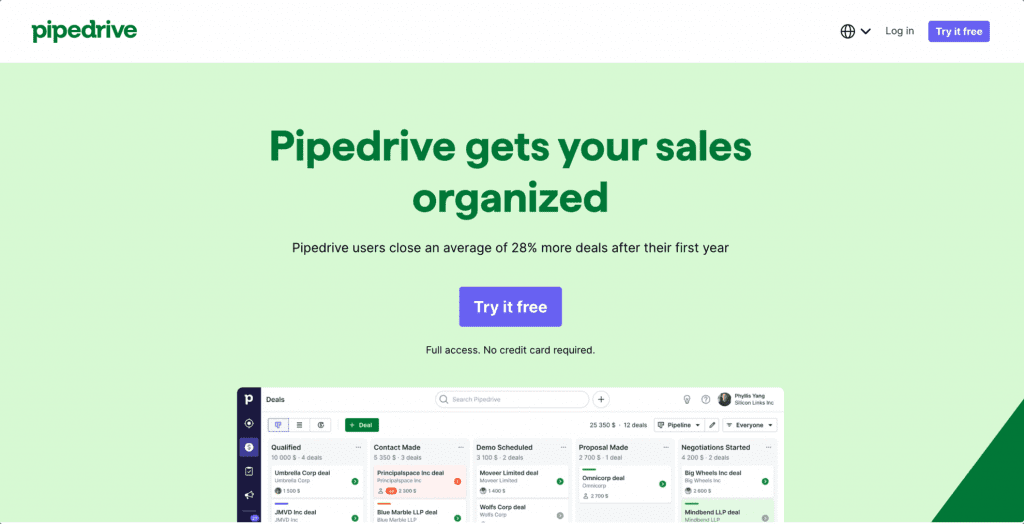
Pipedrive CRM software, excels with its robust features tailored for small businesses seeking efficient sales pipeline management.
- Offers advanced contact management features.
- Utilizes annual billing with a 14-day free trial.
- Provides customizable automation options for streamlined operations.
HubSpot CRM
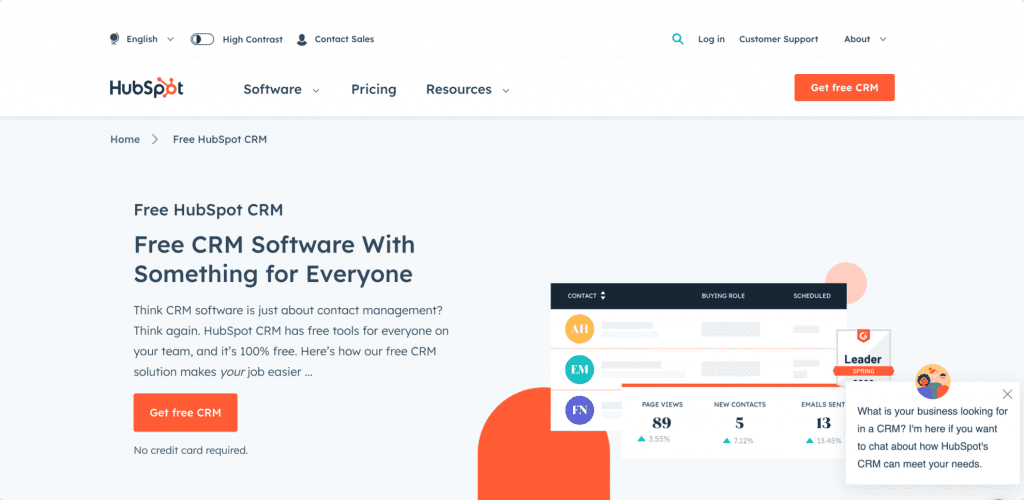
HubSpot CRM, a leading CRM software, this platform stands out for its user-friendly interface and advanced customer relationship management features tailored for online businesses.
It offers tools for managing customer relationships, advanced features for payment processing, and is highly recommended for small businesses seeking to streamline their ecommerce operations efficiently.
HubSpot CRM’s versatility and excellent payment processing capabilities make it a top choice for ecommerce teams.
BigCommerce CRM
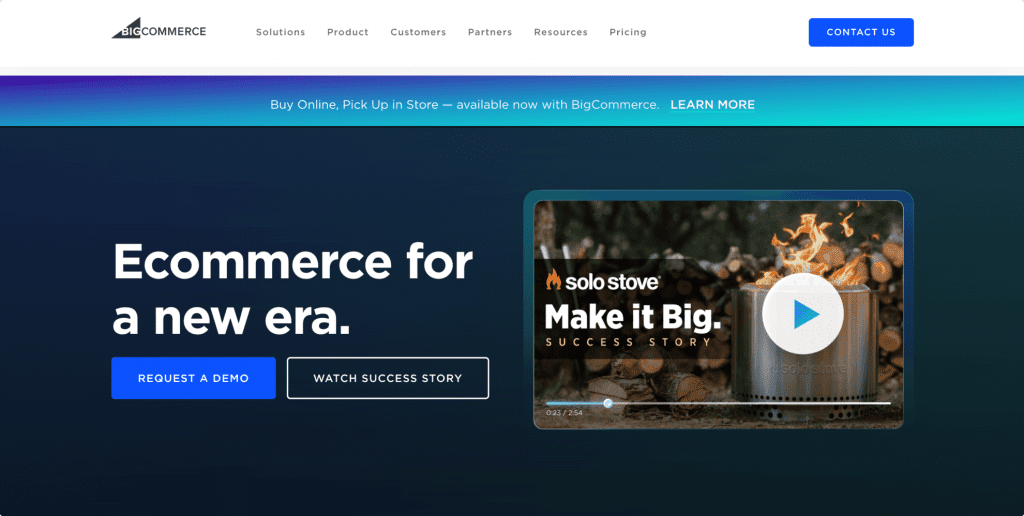
BigCommerce CRM, a standout choice for small businesses in the ecommerce industry, offers a wide array of advanced features tailored to improve customer management and drive sales growth efficiently.
- Seamless integration for customer management
- Detailed analytics and reporting tools
- User-friendly interfaces and customizable features

Key CRM Features and Benefits for Ecommerce Businesses
Ecommerce businesses benefit from key CRM features that streamline operations and improve customer engagement to drive growth in the online retail sector.
These tools offer sales tracking, team collaboration, marketing ROI analytics, and inventory management.
By centralizing customer information and enhancing sales monitoring, businesses can efficiently manage operations and foster better collaboration among teams.
Leveraging these features optimizes processes, boosts customer engagement, and increases profitability in the ecommerce domain.
Best practices for choosing the best CRM for ecommerce
When selecting the ideal CRM for your ecommerce business, prioritize features that align with your specific operational requirements and growth goals.
Consider the scalability of the CRM tool to accommodate your growing ecommerce business needs.
Look for features like inventory management, order processing, and payment integration to streamline operations.
Evaluate the CRM’s user-friendly interface for easy adoption in your ecommerce environment.
How Ecommerce CRM Helps Improve Customer Lifetime Value
Utilize Ecommerce CRM tools to optimize customer lifetime value through personalized experiences and targeted marketing strategies. By analyzing customer data, these tools help segment customers effectively and boost repeat purchases.
You can automate marketing campaigns, measure their effectiveness, and improve customer loyalty. Tracking interactions across platforms guarantees seamless experiences, leading to improved retention rates and increased revenue growth.
Essential Of Ecommerce CRMs for Marketing and Customer Retention?
When it pertains to essential Ecommerce CRM tools for marketing and customer retention, understanding your audience is crucial. Personalization and automation play a significant role in engaging customers effectively and driving sales.
Providing excellent customer support and focusing on retention strategies are key components of a successful CRM approach.
Know Your Audience
Understanding your audience plays a pivotal role in maximizing marketing effectiveness and customer retention within eCommerce CRM systems.
- Customer segmentation allows for targeted marketing campaigns.
- Personalized marketing improves customer retention rates.
- Data analytics enable tailored communication based on customer insights.
Personalization
Personalization significantly improves customer retention and boosts marketing effectiveness in eCommerce CRM systems. By providing relevant offers and personalized email campaigns, you can elevate customer engagement and loyalty. According to statistics, personalized approaches can boost customer retention by 80% and generate 6x higher transaction rates. Customers are more likely to shop with brands that recognize their preferences and tailor their shopping experience.
| Benefit | Statistics | Impact |
|---|---|---|
| Customer Retention | Increases by 80% | Boosts loyalty |
| Relevant Offers | 91% more likely to shop with brands offering these | Drives sales |
| Personalized Email Campaigns | 6x higher transaction rates | Improves marketing effectiveness |
| Customer Engagement | Recognizing customers’ preferences enhances engagement | Strengthens brand-customer relationship |
| Loyalty | Personalization leads to increased loyalty and repeat purchases | Builds long-term customer relationships |
Automation Magic
Are you curious about how automation magic in Ecommerce CRMs can transform your marketing strategies and boost customer retention?
- Ecommerce CRMs automate tasks like sending personalized emails and creating targeted campaigns.
- Automation boosts customer retention through timely and relevant communication.
- Streamlining order processing with automation results in increased sales and improved customer satisfaction.
Customer Support
Customer support plays a pivotal role in the success of Ecommerce CRMs by enhancing customer satisfaction and fostering loyalty. Integrated customer support tools in ecommerce CRMs can boost customer satisfaction by 47%, with competent customer service agents being essential for a positive experience.
Effective customer support can increase loyalty by 15% and help reduce churn rates by up to 33%, highlighting its importance in retaining customers.
Retention
Using ecommerce CRM tools is crucial for improving marketing strategies and fostering customer retention in the competitive online landscape.
- Implement targeted marketing campaigns to boost engagement and loyalty.
- Analyze customer lifetime value for better retention strategies.
- Automate personalized communication for improved customer satisfaction and repeat purchases.

Conclusion
To sum up, investing in the appropriate eCommerce CRM tool can be the key to unleashing your small business’s full potential in the digital marketplace.
With features like customer data management, sales analytics, and marketing automation, these tools empower you to streamline operations, boost sales, and improve customer experience.
So, why settle for mediocrity when you can transform your business and drive sustainable growth with the help of excellent CRM solutions?
FAQs about Best Ecommerce CRM
How is CRM used in eCommerce?
CRM is used in eCommerce to manage customer relationships, track customer interactions, and improve customer satisfaction.
It helps businesses personalize marketing campaigns, analyze customer behavior, and provide better customer support.
What is the role in CRM in e commerce?
CRM (Customer Relationship Management) plays a crucial role in e-commerce by managing and nurturing customer relationships throughout the customer journey.
It enables businesses to track customer interactions, collect data, analyze customer behavior, and personalize marketing efforts to enhance customer satisfaction and loyalty.
How to implement CRM in eCommerce?
To implement CRM in eCommerce, follow these steps:
Select a CRM – Choose a platform that aligns with your eCommerce requirements.
Integrate CRM – Connect the CRM with your eCommerce website.
Collect Data – Set up mechanisms for customer data collection and storage.
Segment Customers – Divide your customer base for targeted marketing.
Track Interactions – Use CRM to monitor customer interactions and purchases.
Personalize Support – Offer customized support using CRM tools.
Automate Processes – Implement automation to save time and streamline workflows.
Optimize Strategies – Regularly analyze CRM data to refine strategies.




